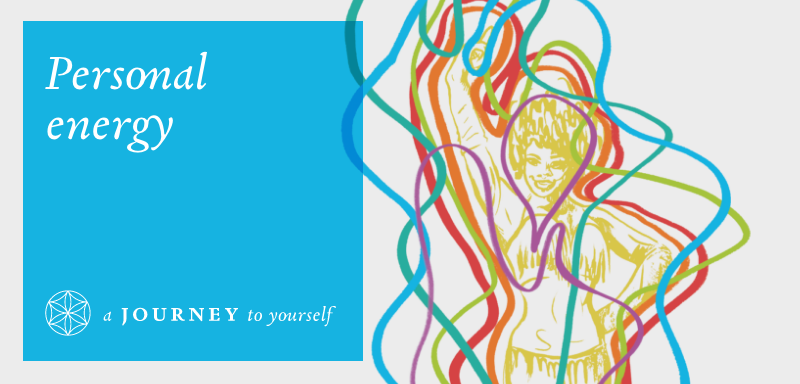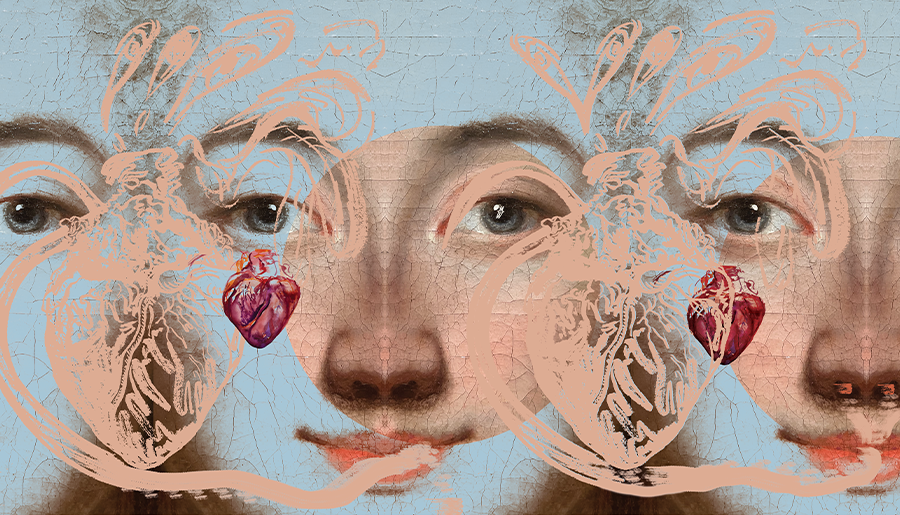You have a creative potential within. You get the impulse to use it through inspiration. But what keeps you expressing yourself? Why are you stuck in the creative process until your creation is finished? What makes you lose yourself in the act of creating? What strength pushes you towards self-realization and allows you to persevere in your actions?
Are creativity and inspiration enough for an artist to create a masterpiece? No, he needs a passion to finish what he started. Who would a real creator be without passion?
In this article you will:
- Learn what passion is.
- See how emotions are shaped on the map of consciousness.
Passion, what is it?
You can speak with passion, live with passion and you can also kill someone with passion.
The definition of passion is not simple, and it is hard to find it. It is often confused with a hobby but it is not the same. The dictionary of the Polish language says that passion is deep commitment and interest in something you really like to do. Zeal, enthusiasm, attraction, love, but also anger, rage, fury, amok, and frenzy. Strong and difficult to control emotion.
The word passion itself comes from the Latin word “passio”, meaning suffering. The Italian word “passionato” means passion. The French word “passion” means feelings, affects, emotions, sentiments, love, and being in love. So, passion is a willingness to suffer for what you love.
There is also the word “com-passion” in the English language, meaning the willingness to suffer with others.
Hence it is understandable why the word passion is also used to describe the passion of Christ. To suffer and be a victim is one thing, but to suffer and be victorious is the essence of humanity.
So, it can be concluded that passion is a force that is difficult to define, which leads you permanently through the whole range of emotions, from suffering to love.

Passion is something that comes straight from your heart, not your mind.
It is a gleam in the eye and a desire to act. Sometimes it is irrational and has no logical justification. Something that nourishes your soul and fills you with life energy. This is what when you do, you feel that you are living your life to the fullest. Something that keeps you from feeling tired or the passage of time. Something that makes you stop calculating whether something is profitable for you or not, but you do it anyway and against everything. It is the feeling that you feel when you vent and express it.
People who change their lives and the world do it by following their passion. They create their reality by following it. Letting it lead them. They trust it 100%, they do not rationalize, control, or embed. They are determined, convinced and they love.
Inspiration inspires and drives you to act, but passion is the fuel that allows you to persevere in this action. When you have a passion for something, you love it, even if you hate it.
The breath inspires you to act.
You come into the world, catch it, and usually cry right after that, so act. You start a fight for your survival. Breathing through the nerves of the parasympathetic and sympathetic nervous systems mobilizes your body to fight this or calms you down. It influences the production of happiness or stress hormones with the help of the brain. By dosing you with emotions through the brain of mammals, it motivates you to take appropriate actions for your survival.
However, looking at this process from the other side, you can also say that the primary goal of each of your actions is to bring about a specific feeling. And when you take a closer look, you’ll find that it’s always about overcoming your fear and striving for happiness. It’s a bit of the carrot and stick method used by the universe to motivate you to act. Uses negative and positive emotions to motivate you to develop, to evolve.
The Map of Consciousness.
David R. Hawkins, a psychiatrist, and spiritual teacher analyzed emotions in relation to levels of consciousness and constructed a map of consciousness. Thanks to it, you can see what feelings accompany you at different stages of the process of self-realization, i.e. creating yourself. He showed these emotions on a logarithmic scale of energy power in the range from 1 to 1000, because emotions are also energy and have their own vibration.
| Level | Frequency | State of Mind | View of God | View of Life | Process | |
| Enlightenment | 700-1000 | Ineffable | Self | Is | Pure Consciousness | |
| Peace | 600 | Bliss | All-Being | Perfect | Illumination | |
| Joy | 540 | Serenity | One | Complete | Transfiguration | |
| Love | 500 | Reverence | Loving | Bening | Revelation | |
| Reason | 400 | Understanding | Wise | Meaningful | Abstraction | |
| Acceptance | 350 | Forgiveness | Merciful | Harmonious | Transcendence | |
| Willingness | 310 | Opitimism | Inspiring | Hopeful | Intention | |
| Neutrality | 250 | Trust | Enabling | Satisfactory | Release | |
| Courage | 200 | Affirmation | Permitting | Feasible | Empowerment | |
| Pride | 175 | Scorn | Indifferent | Demanding | Inflation | |
| Anger | 150 | Hate | Vengeful | Antagonistic | Aggression | |
| Desire | 125 | Craving | Denying | Disappointing | Enslavement | |
| Fear | 100 | Anxiety | Punitive | Frightening | Withdrawal | |
| Grief | 75 | Regret | Disdainful | Tragic | Despondency | |
| Apathy | 50 | Despair | Condemning | Hopeless | Abdication | |
| Guilt | 30 | Blame | Vindictive | Evil | Destruction | |
| Shame | 20 | Humiliation | Despising | Miserrable | Elimination |
At the very bottom of the scale, he put a shame that is, humiliation and loss of face. Leading to cruelty towards oneself and others and destructive to life. In the next place, guilt, i.e. the will to impose and bear the punishment. Leading to rejection, masochism, remorse, and self-sabotage. The reason for suicidal tendencies and designing self-hatred on others. Above it, he placed apathy, i.e. hopelessness and lack of will to live. Right after it is grief, helplessness, despair, a sense of loss. Separation, depression, sadness, feeling of being a loser.
Fear followed by a feeling of being in danger and being in danger.
Immediately after it, desire, that is, the search for gain, pleasure, reward. Then anger, which is a way to deal with what causes fear. After that, pride, focusing on your own achievements, the desire to be recognized, unique and perfect. Status.
Above it, courage, determination, life excitement, productivity, independence, and a sense of agency. Next, neutrality, that is, non-judgment and non-competition, pragmatism. After it, the desire, i.e. energy supporting survival through a positive attitude, friendliness, helpfulness, and willingness to help others. Above it, acceptance, submission to the current of life.
Reason objectivity even higher. Then love. Forgiving and supporting others. Immediately followed by joy in the understanding of unconditional love regardless of the circumstances and actions of others. Beauty, perfection, self-discovery, compassion for everything, extraordinary patience. Concern for the happiness of others, a sense of self-realization, and self-sufficiency. In the end, he placed peace or bliss, effortlessness, unity, divinity. Illumination and enlightenment.
Your every action begins with the shame and guilt of that shame that leads to apathy.
Apathy, on the other hand, is based on the belief “I can’t.” It arises from fear, which means “I don’t want to”. When you look at your anxiety you really want to do what you fear. When you look at your desire, you feel sorry for all the situations that you haven’t used in the past to do what makes you angry. Anger motivates you to take steps to do something about it.
When you finally start making changes, you feel proud of yourself, which gives you the courage to act and even more willingness. This pushes you towards fully accepting “I can do it.” Opening you to mindfulness on others. You then become aware of the pain, suffering, and fear of others and begin to care. When your compassion increases, your selflessness increases. Helping others starts to make you happy, and this leads to peace. You forget about yourself and care more for the other person. Then you take pleasure in the achievements of others. You discover compassion, a sense of connection with others, and compassion for their suffering.
Hawkins showed how, through emotions, we move from existence through physical mastery, empowerment, compassion, wisdom, to unity. As from individualization and the need to survive, through a sense of self-strength and the search for pleasure, the ability to influence others, power, love, cooperation, finding the purpose of one’s life, expression and self-acceptance of one’s own uniqueness, as well as the need for transcendence and the need to experience divinity, we unite personal experience with a collective experience of harmonizing with God’s will.
You are the creator of your life.
You exist not to be content with the minimum, but because it works. Your task is to experience a whole range of experiences and emotions. You will never know what you are capable of unless you go beyond your comfort zone. Passion can lead you beyond it.
If you want to live life to the fullest, you must find it and realize yourself in it. If you are afraid to go to work, you lack motivation, you are bored in it or you do it routinely, you are not following your passion. Following your passion is the key to fulfillment and purpose in life. It is a source of joy, a sense of fulfillment, and self-realization. Dedication and determination in pursuing the goal. These are emotions and feelings of the highest degree, a mechanism that drives human behavior.
At the beginning of your career, you don’t always have the luck, patience, courage, and determination to find it. Sometimes it is because of your life plan. And sometimes you just have to tame the insecurity of getting to know yourself. Passion is the force that pushes you towards finding your life goal. Remembering the contract you made with yourself before you came into this world.
Source:
Dawid R. Hawkins “Letting go: The Pathway of Surrender”, („Technika uwalniania”), Virgo Książki Budzące Świadomość, Warszawa 2016.

